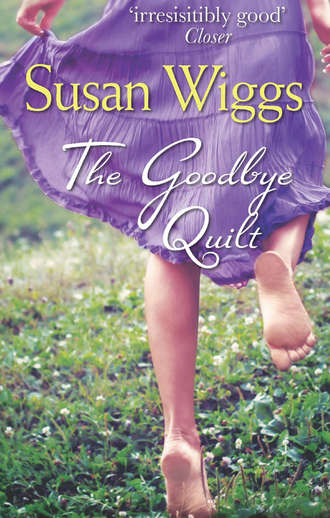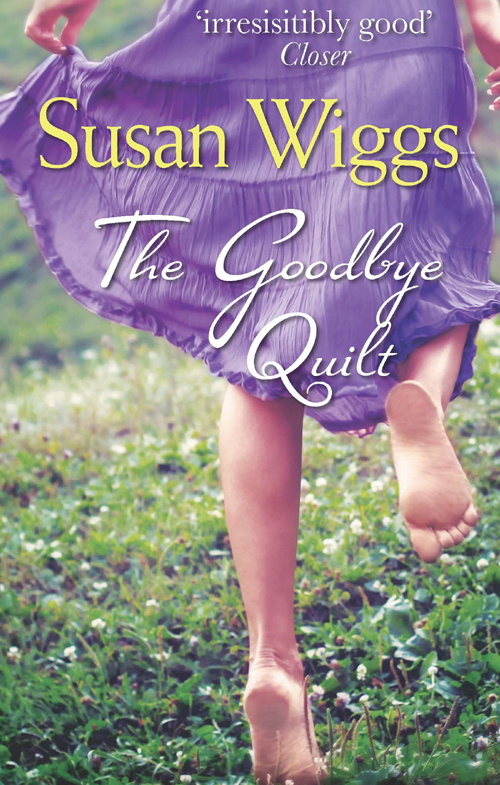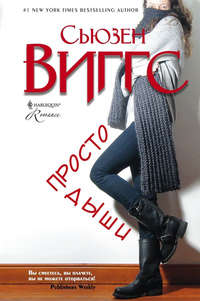
Полная версия
The Goodbye Quilt


Also by SUSAN WIGGS
Contemporary HOME BEFORE DARK THE OCEAN BETWEEN US SUMMER BY THE SEA TABLE FOR FIVE LAKESIDE COTTAGE JUST BREATHE
The Lakeshore Chronicles SUMMER AT WILLOW LAKE THE WINTER LODGE DOCKSIDE SNOWFALL AT WILLOW LAKE FIRESIDE LAKESHORE CHRISTMAS THE SUMMER HIDEAWAY MARRYING DAISY BELLAMY
Historical THE LIGHTKEEPER THE DRIFTER
The Tudor Rose Trilogy AT THE KING’S COMMAND THE MAIDEN’S HAND AT THE QUEEN’S SUMMONS
Chicago Fire Trilogy THE HOSTAGE THE MISTRESS THE FIREBRAND
Calhoun Chronicles THE CHARM SCHOOL THE HORSEMASTER’S DAUGHTER HALFWAY TO HEAVEN ENCHANTED AFTERNOON A SUMMER AFFAIR
The
Goodbye
Quilt
SUSAN WIGGS

www.mirabooks.co.uk
To my curly-headed daughter, Elizabeth—
you are my sunshine.
ACKNOWLEDGMENTS
I’m very fortunate to have a publisher that allows me to put my heart on paper. Many thanks to my editor and great friend, Margaret O’Neill Marbury, and to everyone at MIRA Books. As always, I’m indebted to Meg Ruley, Annelise Robey and their associates at the Jane Rotrosen Agency—your wisdom, patience and friendship mean the world to me.
To my fellow writers—Anjali Banerjee, Kate Breslin, Carol Cassella, Sheila Roberts and Suzanne Selfors—thank you so much for reading multiple drafts and helping me pull this patchwork of emotion together.
I’m grateful to master quilter Marybeth O’Halloran for the insights and expertise into her colorful world—any liberties and errors in the text are my own. A very special thank-you to my dear friend, Joan Vassiliadis, for creating the original Goodbye Quilt and for sharing her talent in the pages of this book.
DAY ONE
Odometer Reading 121,047
Wanted: a needle swift enough
to sew this poem into a blanket.
—Charles Simic,
Serbian-American poet

Chapter One
How do you say goodbye to a piece of your heart? If you’re a quilter, you have a time-honored way to express yourself.
A quilt is an object of peculiar intimacy. By virtue of the way it is created, every inch of the fabric is touched. Each scrap absorbs the quilter’s scent and the invisible oils of her skin, the smell of her household and, thanks to the constant pinning and stitching, her blood in the tiniest of quantities. And tears, though she might be loath to admit it.
My adult life has been a patchwork of projects, most of which were fleeting fancies of overreaching vision. I tend to seize on things, only to abandon them due to a lack of time, talent or inclination. There are a few things I’m truly good at—Jeopardy!, riding a bike, balancing a checkbook, orienteering, making balloon animals … and quilting.
I’m good at pulling together little bits and pieces of disparate objects. The process suits me. Each square captures my attention like a new landscape. Everything about quilting suits me, an occupation for hands and heart and imagination.
Other things didn’t work out so well—Szechuan cooking, topiary gardening, video games and philately come to mind.
My main project, my ultimate work-in-progress, is Molly, of course. And today she’s going away to college, clear across the country. Correction—I’m taking her away, delivering her like an insured parcel to a new life.
Hence the quilt. What better memento to give my daughter than a handmade quilt to keep in her dorm room, a comforter stitched with all the memories of her childhood? It’ll be a tangible reminder of who she is, where she comes from … and maybe, if I’m lucky, it will offer a glimpse of her dreams.
All my quilting supplies come from a shop in town called Pins & Needles. The place occupies a vintage building on the main street. It’s been in continuous operation for more than five decades. As a child, I passed its redbrick and figured concrete storefront on my way to school each day, and I still remember the kaleidoscope of fabrics in the window, flyers announcing classes and raffles, the rainbow array of rich-colored thread, the treasure trove of glittering notions. My first job as a teenager was at the shop, cutting fabric and ringing up purchases.
When Molly started school, I worked there part time, as much for the extra money as for the company of women who frequented Pins & Needles. Fall is wonderful at the fabric shop, a nesting time, when people are making Halloween costumes, Thanksgiving centerpieces and Christmas decorations. People are never in a hurry in a fabric shop. They browse. They talk about their projects, giving you a glimpse of their lives.
The shop is a natural gathering place for women. The people I’ve met there through the years have become my friends. Customers and staff members stand around the cutting tables to discuss projects, give demonstrations and workshops, offer advice on everything from quilting techniques to child rearing to marriage. The ladies there all know about my idea to make a quilt as a going-away gift for Molly. Some of them even created pieces for me to add, embroidered with messages of “Good Luck” and “Congratulations.”
You can always tell what’s going on in a woman’s life based on the quilt she’s working on. The new-baby quilts are always light and soft, the wedding quilts pure and clean, filled with tradition, as though a beautiful design might be an inoculation against future strife. Housewarming quilts tend to be artistic, suitable for hanging on an undecorated wall. The most lovingly created quilts of all are the memory quilts, often created as a group project to commemorate a significant event, help with healing or to celebrate a life.
I’ve always thought a quilt held together with a woman’s tears to be the strongest of all.
Nonquilters have a hard time getting their heads around the time and trouble of a project like this. My friend Cherisse, who has three kids, said, “Linda, honey, I’m just glad to get them out of the house—up and running, with no criminal record.” Another friend confessed, “My daughter would only ruin it. She’s so careless with her things.” My neighbor Erin, who started law school when her son entered first grade, now works long hours and makes a ton of money. “I wish I had the time,” she said wistfully when I showed her my project.
What I’ve found is that you make time for the things that matter to you. Everyone has the time. It’s just a question of deciding what to do with that time. For some people, it’s providing for their family. For others, it’s finding that precarious balance between taking care of business and the soul-work of being there for husband, children, friends and neighbors.
I’m supposed to be making the last-minute preparations before our departure on the epic road trip, but instead I find myself dithering over the quilt, contemplating sashing and borders and whether my color palette is strong and balanced. Although the top is pieced, the backing and batting in place, there is still much work to be done. Embellishments to add. It might not be proper quilting technique, but quilting is an art, not a science. My crafter’s bag is filled with snippets of fabric culled from old, familiar clothes, fabric toys and textiles that have been outgrown, but were too dear or too damaged to take to the Goodwill bin. I’m a big believer in charity bins. Just because a garment is no longer suitable doesn’t mean it couldn’t be right for someone else. On the other hand, some things are not meant to be parted with.
I sift through the myriad moments of Molly’s childhood, which I keep close to my heart, like flowers from a prized bouquet, carefully pressed between sheets of blotter paper. I fold the quilt and put it in the bag with all the bright bits and mementos—a tiny swatch of a babydoll’s nightie, an official-looking Girl Scout badge, a precious button that is the only survivor of her first Christmas dress… . So many memories lie mute within this long-handled bag, waiting for me to use them as the final embellishments on this work of art.
I’ll never finish in time.
You can do this. I try to give myself a pep talk, but the words fall through my mind and trickle away. This is unexpected, this inability to focus. A panic I haven’t been expecting rises up in me, grabbing invisibly at my chest. Breathe, I tell myself. Breathe.
The house already feels different; a heaviness hangs in the drapes over the old chintz sofa. Sounds echo on the wooden floors—a suitcase being rolled to the front porch, a set of keys dropped on the hall table. An air of change hovers over everything.
Dan has driven to the Chevron station to fill the Suburban’s tank. He’s not coming; this long drive without him will be a first for our family. Until now, every road trip has involved all three of us—Yellowstone, Bryce Canyon, Big Sur, speeding along endless highways with the music turned up loud. We did everything as a family. I can’t even remember what Dan and I used to do before Molly. Those days seem like a life that happened to someone else. We were a couple, but Molly made us a family.
This time, Dan will stay home with Hoover, who is getting on in years and doesn’t do well at the kennel anymore.
It’s better this way. Dan was never fond of saying goodbye. Not that anybody enjoys it, but in our family, I’m always the stoic, the one who makes the emotional work look easy—on the outside, anyway. My solo drive back home will be another first for me. I hope I’ll use the time well, getting to know myself again, maybe. Scary thought—what if I get to know myself and I’m someone I don’t want to be?
Now, as the heaviness of the impending departure presses down on me, I wonder if we should have planned things differently. Perhaps the three of us should have made this journey together, treating it as a family vacation, like a trip to Disney World or the Grand Canyon.
On the other hand, that’s a bad idea. There can be no fooling ourselves into thinking this is something other than what it is—the willful ejection of Molly from our nest. It’s too late for second thoughts, anyway. She has to be moved into her dorm in time for freshman orientation. It’s been marked on the kitchen calendar for weeks—the expiration date on her childhood.
At the other end of the downstairs, a chord sounds on the piano. Molly tends to sit down and play when she has a lot on her mind. Maybe it’s her way of sorting things out.
I’m grateful for the years of lessons she took, even when we could barely afford them. I wanted my daughter to have things I never had, and music lessons are one of them. She’s turned into an expressive musician, transforming standard pieces into something heartfelt and mystical. Showy trills and glissandos sluice through the air, filling every empty space in the house. The piano will sit fallow and silent when she’s away; neither Dan nor I play. He never had the time to learn; I never had the wherewithal or—I admit it—the patience. Ah, but Molly. She was fascinated with the instrument from the time she stretched up on toddler legs to reach the keys of the secondhand piano we bought at auction. She started lessons when she was only six.
All the hours of practice made up the sound track of her growing years. “Bill Grogan’s Goat” was an early favorite, leading to more challenging works, from “The Rainbow Connection” to “Für Elise,” Bartok and beyond. Almost every evening for the past twelve years, Molly practiced while Dan and I cleaned up after dinner. This was her way of avoiding dishwashing duty, and we considered it a fair division of labor—I rinse, he loads, she serenades. She managed to make it to age eighteen without learning to properly load a dishwasher, yet she can play Rachmaninoff.
In the middle of a dramatic pause between chords, a car horn sounds.
The bag with the quilt falls, momentarily forgotten, to the floor. That innocent yip of the horn signals that summer has ended.
Molly stops playing, leaving a profound hollow of silence in the house. Seconds later, I can still feel the throb of the notes in the stillness. I go to the landing at the turn of the stairs in time to see her jump up, leaving the piano bench askew.
She runs outside, the screen door snapping shut behind her like a mousetrap. Watching through the window on the landing, I brace myself for another storm of emotion. She has been saying goodbye to Travis all summer long. Today, the farewell will be final.
Here is a picture of Molly: Curly hair wadded into a messy ponytail. Athletic shorts balanced on her hip bones, a T-shirt with a dead rock star on it. A body toned by youth, volleyball and weekend swims at the lake. A face that shows every emotion, even when she doesn’t want it to.
Now she flings herself into her boyfriend’s arms as a sob breaks from her, mingling with the sound of morning birdsong. Oh, that yearning, the piercing kind only love-dazed teenagers can feel. Hands holding for the last time. Grief written in their posture as their bodies melt together. Travis’s arms encircle her with their ropy strength, and his long form bows protectively, walling her off from me.
This kid is both the best and worst kind of boyfriend a mother wants for her daughter. The best, because he’s a safe driver and he respects her. The worst, because he incites a passion and loyalty in Molly that impairs her vision of the future.
Last spring, he won her heart like a carnival prize in a ring toss, and they’ve been inseparable ever since. He is impossibly, irresistibly good-looking, and there’s no denying that he’s been good to her. He makes no secret of the fact that he doesn’t want her to go away. He wants her to feel as if he is her next step, not college.
All summer I’ve been trying to tell her that the right guy wouldn’t stand in the way of her dreams. The right guy is going to look at her the way Dan once looked at me, as if he could see the whole world in my face. When Travis regards Molly, he’s seeing … not the whole world. His next weekend, maybe.
Hoover lifts his leg and pees on the tire of Travis’s Camaro, the guy’s pride and joy. Travis and Molly don’t notice.
I can’t hear their conversation, but I can see his mouth shape the words: Don’t go.
My heart echoes the sentiment. I want her to stay close, too. The difference is, I know she needs to leave.
Molly speaks; I hope she’s telling him she has to go away, that this opportunity is too big to miss. She has won a scholarship to a world-class private university. She’s getting a chance at a life most people in our small western Wyoming town never dream of. Here in a part of the state that appears roadless and sparse on travel maps, life moves slowly. Our town is filled with good people, harsh weather and a sense that big dreams seem to come true only when you leave. The main industry here is a plant that makes prefab log homes.
I turn away from the window, giving Molly her private farewell. She is far more upset about leaving Travis than about leaving Dan and me, a fact that is hard to swallow.
Dan comes back from the service station. He visits with Travis briefly. I compare the two of them as they stand together talking. Dan is solidly built, his shoulders and arms sculpted by his years at the plant before he made supervisor. He looks as grounded and dependable as the pickup truck he drives. By contrast, Travis is tall and lithe with youth, his slender body curving into a question mark as he gestures with pride at his cherry-red car.
The two of them shake hands; then Dan heads inside. Our eyes meet and skate away; we’re not ready to talk yet. In the kitchen, the two of us make a few final preparations—bundling road maps together, adding ice to the cooler of drinks.
Summer glares against the screen door, its hot scent a reminder that the day is already a few hours old. I think of a thousand other summer days, whiled away without a care for the slow passing of time. We built a tree house, went on bike rides, hung a rope swing over a swimming hole, made sno-cones, watched ants on the march. We lay faceup in the grass and stared at clouds until our eyes watered. We fought about curfews, shopped for back-to-school supplies, sang along with songs on the radio. We laughed at nothing until our sides ached, and cried at movies with sad endings.
I sneak a glance at Dan. I can’t picture him crying at the movies with me. That was always Molly’s role, the exclusive domain of females. Without really planning to, she and I created rituals and traditions, and these things formed a powerful bond.
There is a vehemence to the thoughts tearing through my head, a sense of rebellion—How can I just let her go? I didn’t sign up for this—for creating my greatest work only to have to shove her away from me.
When I pushed her out into the world, she was handed immediately into my arms. I never thought of letting her go, only of holding her next to my heart, under which she’d grown, already adored by the time she made her appearance. The idea of her leaving was an abstraction, a nonspecified Someday. Now it’s all happening, exactly as we planned. Except I didn’t plan for it to throttle me.
Dan seems easy about the process. He’s always accepted—even welcomed—life’s movements from one phase to the next, like birthdays or promotions at work. He is the sort of person who makes life look effortless, a trait I admire and sometimes envy in him.
As for me, I find myself unable to move. I’m not ready. This wrenching grief has blindsided me. I didn’t expect it to be this intense. All kids leave home. That’s the way it works. If you do your job of parenting correctly, this is the end result. They leave. When it doesn’t work that way, that’s when a mother should worry. If the kid sticks around, takes up permanent residence in her childhood bedroom, you’re considered a failure.
Ah, but the price of succeeding is a piece of your soul. I bite my lip to keep from trying to explain this to Dan. He would tell me I’m being overly dramatic. Maybe so, but everything about this process feels dramatic. This child has been the focus of every day of my life for the past eighteen years. After being a parent for so long, I am forced to surrender the role. Now, all of a sudden, a void has opened up.
Snap out of it, I tell myself. I have so much to be thankful for—this rich, full life. Health, husband and home. And lots to look forward to. It’s wrong to mope and wallow in the tragedy of it all. What’s the matter with me?
The matter is this—I’m facing a huge loss. The biggest part of my daughter’s life is about to start, and it doesn’t include me and Dan. Granted, we’ve had plenty of time to prepare, but now that the moment has arrived, it’s as unexpectedly painful as a sudden accident.
Although greeting card companies have created themes around every possible life event, there’s no ritual for this particular transition.
This is surprising, because when a child leaves for college, it is the end of something. Other than birth or death, leaving home for any reason is the most extreme of life transitions. One moment we’re a family of three. The next, we’ve lost a vital member. It’s a true loss, only people don’t understand your grief. They don’t send you sympathy cards or invite you to join a support group. They don’t flock to comfort you. They don’t come to your door bearing tuna casseroles and bottles of Cold Duck and platters of cookies on their good chintz china.
Instead, the journey to college is a rite of passage we mark as a joyous occasion, one we celebrate by buying luggage and books on how to build a fulfilling life. But really, if you ask any mother, she’ll tell you that deep down, we want to mark it as a loss, a funeral of sorts. We never show our sorrow, though. Our sadness stays in the shadows like something slightly shameful.
Travis leaves, peeling himself away like a Band-aid that’s been stuck on too long. His union job at the plant keeps him on a strict schedule; he cannot linger. Molly stands on the front sidewalk and watches his Camaro growing smaller and smaller down the tree-lined street, flanked by timber frame houses from the 1920s, remnants of the days when this was a company town. Molly’s face is stiff and pale, as if she’s been shocked and disoriented by unexpected pain. Her arms are folded across her middle.
I hurry outside, wanting to comfort her. “I know it’s hard,” I say, giving her a hug.
She is stiff and unyielding, regarding me like an intruder. “You have no idea how this feels,” she says. “You never had to leave Dad.”
She’s right. Dan and I met at a bar twenty-some years ago, and after our first dance together, we already knew we’d be a couple. If somebody had told me I had to leave him and head off to a world of strangers, would I have been willing to do that? Yes, shouts a seldom-heard voice inside me—oh, yes.
Molly waits for an answer.
“Aw, Moll. Your dad and I were in a much different place—”
“Nobody forced you two apart,” she says, her voice rising.
“And nobody’s forcing you and Travis apart.”
“Then why am I leaving? Why am I going thousands of miles away?”
“Because it’s what you’ve always wanted, Molly.”
“Maybe I’ve changed my mind. Maybe I should stay and go to college in state.”
“We need to finish loading the car,” I tell her.
We argue. Loudly, in the driveway. About what won’t fit in the car. About what is necessary, what Molly will not be able to do without. She flounces into the house and returns a few minutes later with a duffel bag and a green-shaded lamp.
“Sweetie, I don’t think you need the lamp,” I point out.
“I want to bring it. I’ve always liked this lamp.” She crams the duffel bag in the back, using it to cushion the lamp.
It has shone over her desk while she worked diligently at connect-the-dots, a report on Edward Lear, a tear-stained journal, a labored-over college essay, a love letter to Travis Spellman. The lamp has been a silent sentinel through the years. Remembering this, I quickly surrender. I don’t want to argue anymore, especially not today.
Like making the quilt, driving her to college seemed like a good idea at the time. She could have flown, and shipped her things separately, but I couldn’t stand the thought of leaving her at the curb at the airport like a houseguest who’s overstayed her welcome.
A road trip just seemed so appealing, a final adventure for the two of us to share. A farewell tour. All through the summer I’ve been picturing us in the old Suburban, stuffed to the top with things Molly will need in the freshman dorm, singing along with the radio and reminiscing about old times. Now as I face the sullen rebellion in Molly’s face, the idyllic picture dissipates.
The trip is still a good idea, though. A long drive with no one but each other for company will give us a chance to talk about matters we’ve been avoiding all summer long, possibly her entire adolescence. When she was little, we discussed the great matters of her life at bedtime, lying together in the dark, watching the play of moon shadows on the ceiling. In high school, she stayed up later than I did, and our conversations shrank to sleepy utterances. Nighttime was punctuated by the creak of a floorboard under a furtive foot, the rasp of a toothbrush washing away the smell of a sneaked beer. Some days, we barely spoke a half-dozen words.








